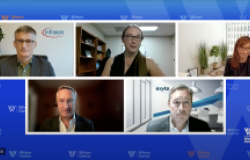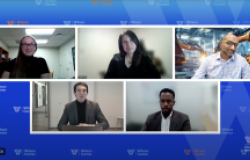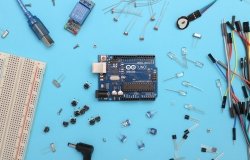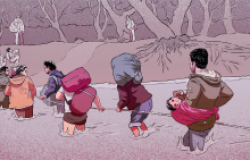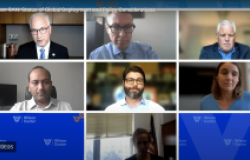
A blog of the Science and Technology Innovation Program
Games Round Up: Games for Change
As part of the Games Round Up blog series, we take a closer look at games featured at the 20th Games for Change Festival.
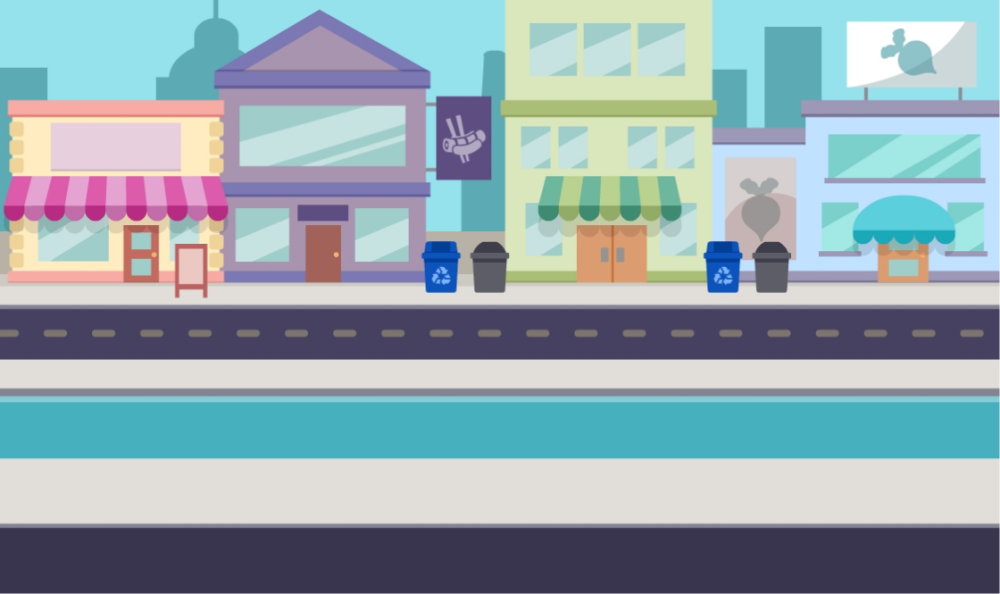
FableVision Studios
The Games for Change 2023 Festival marked 20 years of bringing together expert perspectives, changemakers, developers, executives, and fans in the gaming industry, to share the industry’s lessons learned, its current trends, and predictions for the future of games being used for positive change. Additionally many of the games featured at Games for Change, and in this round up, are games that support United Nations’ Sustainable Development Goals (SDGs). The 17 SDGs, spanning topics from “No Poverty” to “Climate Action”, were created with the intention of building a “blueprint to achieve a better and more sustainable future for all” (Global Goals).
The SDGs are a one policy framework we address here at the Woodrow Wilson International Center for Scholars, so for this Games Round Up, we wanted to highlight some of the best games featured at the Games for Change 2023 Festival that tackled these issues.
Environmental Games:
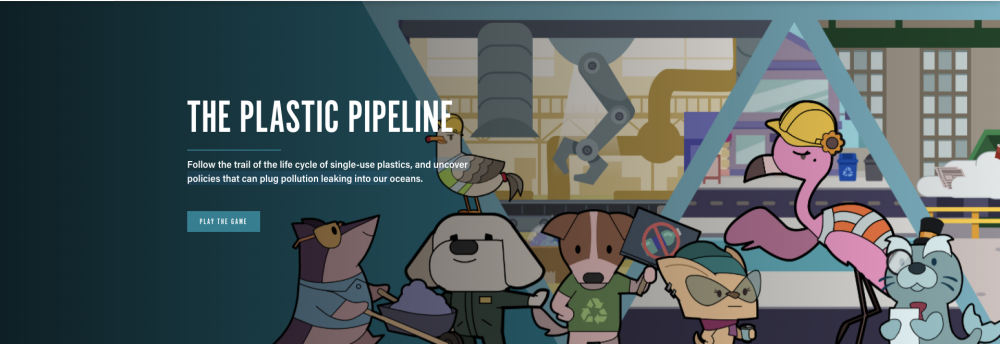
Wilson Center Page
The Plastic Pipeline (2023)
(Free; Web browser; High school +)
SDG Supported:
In The Plastic Pipeline, players explore various facilities where plastics go through the manufacturing process, follow the life cycle of single-use plastics, and uncover policies that can prevent plastic pollution from leaking into our oceans. Learners will engage with critical research and choose which policies to implement in order to find solutions to environmental issues posed by plastic production, and maybe even save a few fish from dying along the way. The game demonstrates the ways in which policy research can be translated into a dynamic medium. To be fair, we're biased; it was built as a collaboration between the Wilson Center's Serious Games Initiative and China Environment Forum and developed by FableVision Studios. This digital game translates those research outcomes into an accessible, engaging manner for the broader public. The Plastic Pipeline game and research was funded with partial support by the National Geographic Society and Luce Foundation.
Beecarbonize (2023)
(Free; PC or phone ; N/A)
SDG Supported:
Award: Best Game Play
Developed by Charles Games (a Prague-based game company), Beecarbonize is a challenging single-player digital environmental card strategy game, where the players take on climate change. What’s at stake? Just your very existence. Throughout the game, players are challenged to see how many seasons they can survive through choosing preventive measures, such as researching the latest technologies, implementing policies, modernizing industry, protecting ecosystems, and cutting down carbon emissions. Beecarbonize was funded by the European Union, Člověk v tísni, and 1 Planet 4 All.
Want to learn more about the topic surrounding Beecarbonize? Ecosystems and the impact of carbon emissions are being explored through our Environmental Change and Security Program.
Civics Games:
Cat Park (2022)
(Free; Web browser; 15+)
SDG Supported:
Award: Best Civics Game
You are alone in the apartment you just moved into, in a brand new city when you get a mysterious anonymous message recruiting you to join a group that is campaigning against a new park for the most logical of inhabitants. Cats. Your mission is to win this campaign at any cost; the truth doesn't matter. Cat Park was created to educate users about “adversarial propaganda and disinformation impacting non-U.S. populations” (Cat Park). Cat Park is a game that teaches players about disinformation, by showing a fictionalized version of the tactics and media manipulation used in real world disinformation campaigns while engaging users through the humorous tone of the game. Cat Park is a joint endeavor by Tilt, Gusmanson Design, the University of Cambridge, and Stitching Sofisterij, with funding from the Department of State’s Global Engagement Center (GEC) and US Embassy The Hague.
Want to learn more about disinformation? Check out the Wilson Centers work on this topic here.
Go Nisha Go™ - My Life My Choice (2022)
(Free; Android; 15+)
SDG Supported:
Award: Most Significant Impact & Best Learning Game
Developed by Howard Delafield International, LLP Go Nisha Go acts as a tool to empower girls with the information, and simulated experience to lead to making informed decisions about their own reproductive health with greater confidence. Created for girls 15 years or older in India, the game is written in Hinglish with future plans to make extensions in other languages to expand accessibility, and is set in Delhi, Rajasthan, and Bihar. This game was made possible with funding from the United States Agency for International Development (USAID)
Want to learn more about the topic surrounding Go Nisha Go? Explore topics ranging from Women’s Political Empowerment and Reproductive Health to health equity and gender equality through work done by our Maternal Health Initiative.
El Viaje de las y los Guardianes (Journey of the Guardians (2021)
(N/A; Board/ Interactive Game; 10+)
SDG Supported:
Award: Best Board or Table Top Game for Impact
Created by the International Organization for Migration (IOM), funded by USAID and the Government of Korea, and developed by Creatura, El Viaje de Las y Los Guardianes (The Journey of the Guardians), is a board game created to raise awareness about the migration phenomenon in Colombia, promote integration, and prevent xenophobia. As a current and pressing issue, the game creation process used educational institutions and community spaces as a soundboard to generate productive conversation amongst the Venezuelan migrant population and the host population of Colombia, leading to holistic insights from each perspective. Throughout the game, players must work together through challenges with other players, (eg., leading each other around the room while blindfolded or switching shoes) to win. As of July 2023, 768 people of all ages in Colombia have played El Viaje de Las y Los Guardianes and shared their experiences with the game.
Want to learn more about the topic surrounding El Viaje de Las y Los Guardianes? Explore topics ranging from Women’s Political Empowerment and Reproductive Health to health equity and gender equality through work done by our Maternal Health Initiative.
Child of Empire (2022)
(N/A; Meta Quest 2; 15+)
SDG Supported: Child of Empire supports the UN Sustainable Development Goals for Peace Justice, and Strong Institutions.
Child of Empire is a virtual reality (VR) docu-drama that immerses users in a conversation between two individuals, an Indian Hindu that migrated from Pakistan to India and a Muslim who migrated from India to Pakistan, during one of the largest forced migrations in human history: the 1947 Partition. The two main characters walk through their personal childhood experiences, based on real accounts of Ishar Das Arora, Jagdish Chandra Ahuja, and Iqbal-ud-Din Ahmed. While everyone can learn from Child of Empire, it is particularly crafted for “South Asian and diaspora youth between 15-30 [... and] young people from Commonwealth countries/ former British colonies” (Project Dastaan). The VR experience was produced by Project Dastaan and Anuz Flims and developed by Catapult Digital and the Arts Council of England. This project is funded by the CatchLight Foundation, Digital Catapult and Arts Council, National Geographic, The British Council, and BFI/ Doc Society. The docu-drama also has garnered attention from major media outlets like TIME, The BCC, Reuters, Elle and more.
Want to learn more about the Wilson Center’s work on migration in the region? Check out the Wilson Center’s Refugee and Forced Displacement Initiative and the South Asia Institute with pieces like Smart Take | Pakistan to Deport Undocumented Afghan Refugees and How Cricket Is Easing India-Pakistan. Tensions.
FIGHT BACK VR / Teaser from Coven on Vimeo.
Fight Back (2022)
(Free; Meta Quest 2; 13+)
SDG Supported: Gender Equality
Fight Back is a 40 minute VR experience created by COVEN and co-produced with France Télévisions Storylab that teaches the player about self defense under the premise of saving the stars from being stolen. In doing so, the game leverages flow and fun through a poignant metaphor, allowing the player to engage in core concepts around self-defense without diving deeply into emotional trauma.. While teaching the user about how to avoid danger, de-escalate conflict, increase self-efficacy and more, the hand tracking component of Fight Back allows the game to give feedback on the physical self defense skills consistently. This experience was inspired by Empowerment Self Defense. Fight Back received support from CNC, Meta, Procirep Société des producteurs - Angoa, Fonds Jeux vidéo - Région Auvergne-Rhône Alpes, Vulcan Productions - Impact Grant, Venice Production Bridge Market 2021, New Images Festival, Festival des Nouveaux Cinémas, and IDFA Doc Lab.




